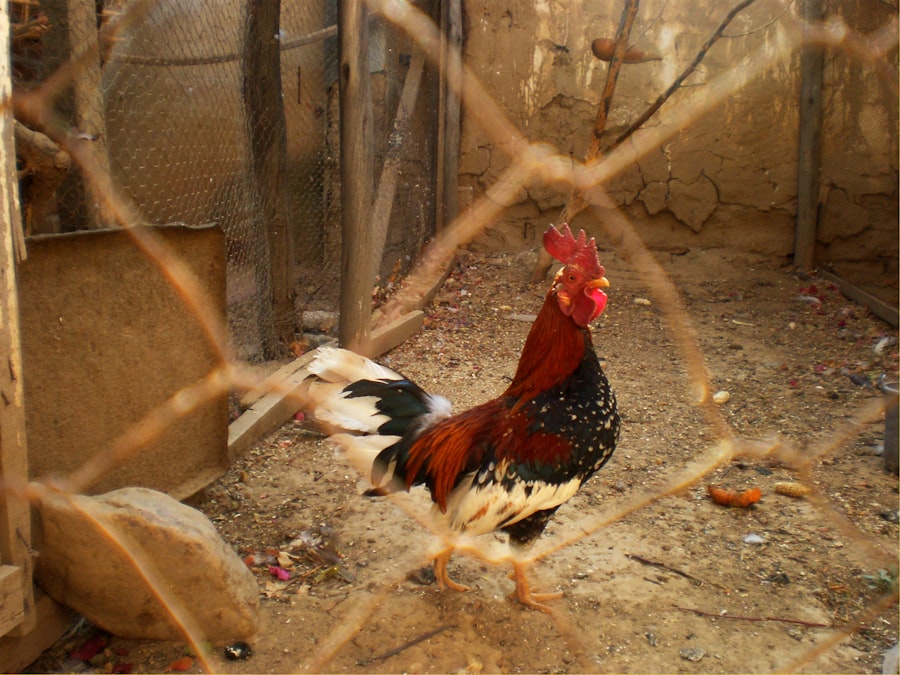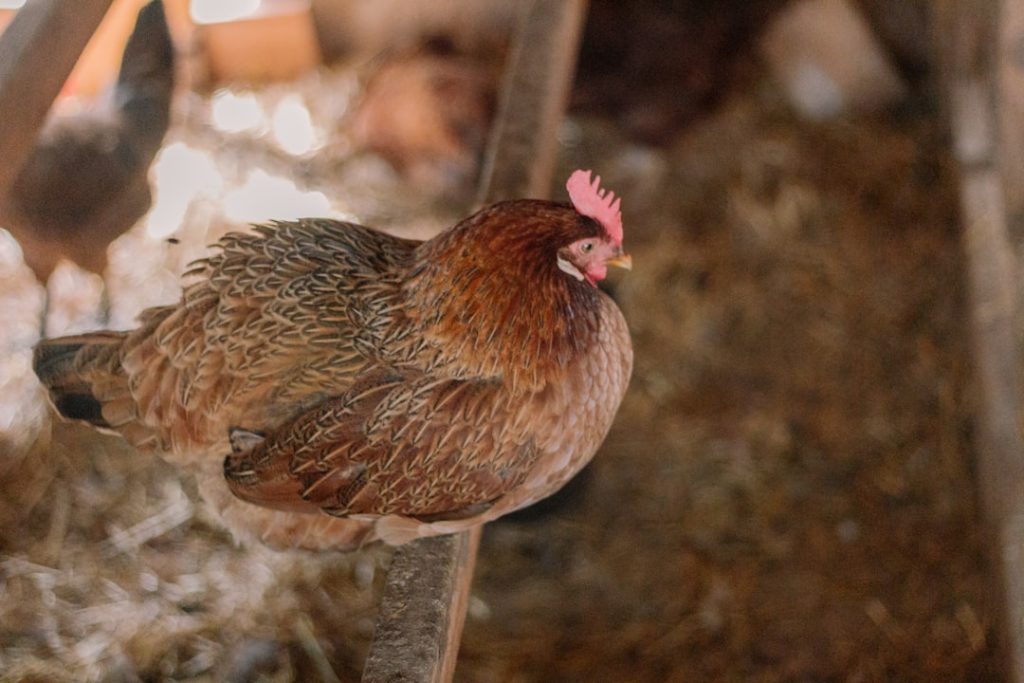Keeping rabbits and chickens together can be a beneficial practice for small-scale farmers and homesteaders. These animals provide multiple resources, including meat, eggs, and fertilizer, making them valuable additions to backyard farms. Rabbits and chickens can also offer companionship and a sense of security to each other.
However, successful cohabitation of these species requires careful planning and management. Several factors must be considered when housing rabbits and chickens together, including coop design, feeding practices, and potential challenges. The living space must accommodate the needs of both species, ensuring proper ventilation, protection from predators, and appropriate nesting areas.
Separate feeding areas and diets are essential, as rabbits and chickens have different nutritional requirements. Potential challenges in keeping rabbits and chickens together include managing territorial behaviors, preventing disease transmission, and addressing differences in temperature preferences. Health and safety concerns must also be addressed, such as regular veterinary check-ups and proper sanitation practices.
By understanding these aspects of rabbit and chicken cohabitation, individuals can make informed decisions about whether this arrangement is suitable for their farming or homesteading needs. Proper management and care can lead to a harmonious and productive environment for both species.
Table of Contents
- 1 Considerations for Co-Habitating Rabbits and Chickens
- 2 Designing a Coop for Rabbits and Chickens
- 3 Feeding and Caring for Rabbits and Chickens Together
- 4 Potential Challenges of Keeping Rabbits and Chickens Together
- 5 Health and Safety Concerns for Rabbits and Chickens in the Same Coop
- 6 Is Keeping Rabbits and Chickens Together Right for You?
- 7 FAQs
- 7.1 Can rabbits and chickens live together in the same coop?
- 7.2 What precautions should be taken when keeping rabbits and chickens together?
- 7.3 Do rabbits and chickens have different dietary needs?
- 7.4 Are there any health concerns when keeping rabbits and chickens together?
- 7.5 Can rabbits and chickens socialize with each other?
- 7.6 What are the benefits of keeping rabbits and chickens together in the same coop?
Key Takeaways
- Rabbits and chickens can be kept together, but it requires careful planning and consideration.
- Consider the size and temperament of both animals before co-habitating rabbits and chickens.
- When designing a coop for rabbits and chickens, ensure there are separate areas for each species to retreat to.
- Feeding and caring for rabbits and chickens together requires a balanced diet and attention to individual needs.
- Potential challenges of keeping rabbits and chickens together include territorial behavior and potential for injury.
Considerations for Co-Habitating Rabbits and Chickens
Space Requirements
Firstly, it’s essential to consider the space requirements for both species. Rabbits need ample space to hop around and exercise, while chickens require space to roam and scratch for food. When designing a coop for both rabbits and chickens, it’s crucial to ensure that there is enough room for both species to move around comfortably without feeling cramped.
Additionally, it’s important to consider the social dynamics between rabbits and chickens. While some rabbits and chickens may get along well, others may not be compatible due to their individual personalities. It’s essential to monitor their interactions closely and be prepared to separate them if any aggression or bullying occurs.
Dietary Needs and Feeding Arrangements
Furthermore, it’s important to consider the dietary needs of both rabbits and chickens. While rabbits primarily eat hay and fresh vegetables, chickens require a diet that includes grains and protein sources such as insects or commercial feed. It’s crucial to provide separate feeding areas to ensure that each species gets the nutrition they need without competition or conflict.
Potential Benefits and Sustainability
When considering co-habitating rabbits and chickens, it’s also important to think about the potential benefits of keeping both species together. For example, rabbits can help keep the coop clean by eating any leftover vegetables or fruits that the chickens may not consume. Additionally, the manure produced by both rabbits and chickens can be used to fertilize gardens or crops, creating a sustainable closed-loop system on the farm. By carefully considering these factors, you can make an informed decision about whether keeping rabbits and chickens together is feasible for your specific situation.
Designing a Coop for Rabbits and Chickens

Designing a coop that is suitable for both rabbits and chickens requires careful planning and consideration of the unique needs of each species. When designing the coop, it’s important to provide separate areas for both rabbits and chickens to ensure that they have their own space to rest, eat, and exercise. For rabbits, the coop should include a hutch or enclosure that provides ample space for hopping and playing, as well as a nesting area for them to rest comfortably.
Additionally, it’s important to provide a solid floor in the rabbit enclosure to protect their sensitive feet from wire mesh or other rough surfaces. For chickens, the coop should include roosting bars for them to perch on at night, as well as nesting boxes for them to lay eggs. The coop should also have adequate ventilation to ensure good air quality and prevent the buildup of ammonia from the animals’ waste.
When designing the outdoor area of the coop, it’s important to provide a secure run for both rabbits and chickens to exercise and explore while being protected from predators. Additionally, it’s crucial to provide ample shade and shelter from the elements to ensure the animals’ comfort and well-being. In addition to providing separate areas for rabbits and chickens, it’s important to consider the materials used in the construction of the coop.
The coop should be made from durable materials that are easy to clean and maintain, such as wood or metal. It’s also important to ensure that the coop is predator-proof to protect the animals from potential threats such as foxes, raccoons, or birds of prey. By carefully designing a coop that meets the needs of both rabbits and chickens, you can create a safe and comfortable living environment for both species.
Feeding and Caring for Rabbits and Chickens Together
Feeding and caring for rabbits and chickens together requires careful consideration of their unique dietary needs and behaviors. When it comes to feeding, it’s important to provide separate feeding areas for both rabbits and chickens to prevent competition or conflict over food. Rabbits primarily eat hay, fresh vegetables, and a small amount of commercial rabbit pellets, while chickens require a diet that includes grains, protein sources such as insects or commercial feed, and access to grit for digestion.
It’s important to monitor the animals’ feeding behaviors closely to ensure that each species is getting the nutrition they need without any issues. Additionally, it’s crucial to provide fresh water at all times for both rabbits and chickens to ensure their hydration needs are met. When caring for rabbits and chickens together, it’s important to provide regular health checks and veterinary care as needed.
This includes monitoring the animals for signs of illness or injury, as well as providing regular grooming and parasite control. In addition to feeding and caring for rabbits and chickens, it’s important to provide enrichment activities to keep the animals mentally stimulated and prevent boredom. For rabbits, this can include providing toys, tunnels, and platforms for them to explore and play on.
For chickens, enrichment activities can include providing perches, dust bathing areas, and access to fresh grass or other natural materials for pecking and scratching. By providing appropriate care and enrichment activities for both rabbits and chickens, you can ensure that they lead happy and healthy lives in a co-habitating environment.
Potential Challenges of Keeping Rabbits and Chickens Together
While keeping rabbits and chickens together can be a rewarding experience, there are potential challenges that may arise when co-habitating these two species. One common challenge is managing their social dynamics, as some rabbits and chickens may not get along well due to their individual personalities. It’s important to monitor their interactions closely and be prepared to separate them if any aggression or bullying occurs.
Additionally, it’s crucial to provide enough space for both species to prevent overcrowding or competition for resources. Another potential challenge of keeping rabbits and chickens together is managing their dietary needs. Rabbits primarily eat hay, fresh vegetables, and a small amount of commercial rabbit pellets, while chickens require a diet that includes grains, protein sources such as insects or commercial feed, and access to grit for digestion.
It’s important to provide separate feeding areas for both species to ensure that they get the nutrition they need without competition or conflict over food. Furthermore, another potential challenge is managing their waste products. Both rabbits and chickens produce manure that can be used as valuable fertilizer for gardens or crops.
However, it’s important to manage their waste products effectively to prevent odor buildup and maintain good hygiene in the coop. By carefully managing these potential challenges, you can create a harmonious living environment for both rabbits and chickens.
Health and Safety Concerns for Rabbits and Chickens in the Same Coop

Disease Transmission and Prevention
One significant concern is managing the risk of disease transmission between rabbits and chickens. While rabbits are generally not susceptible to many of the diseases that affect chickens, there are some diseases such as coccidiosis that can be transmitted between the two species. It’s crucial to practice good biosecurity measures such as regular cleaning and disinfection of the coop to prevent disease transmission between rabbits and chickens.
Parasite Control and Grooming
Another health concern is managing parasites such as mites or lice that may affect both rabbits and chickens. Regular grooming and parasite control are essential to prevent infestations and ensure the animals’ well-being.
Safety Precautions and Environmental Considerations
In terms of safety concerns, it’s crucial to provide a secure coop that is predator-proof to protect both rabbits and chickens from potential threats such as foxes, raccoons, or birds of prey. Additionally, it’s important to provide adequate ventilation in the coop to ensure good air quality and prevent the buildup of ammonia from the animals’ waste. By carefully managing these health and safety concerns, you can create a safe living environment for both rabbits and chickens in a co-habitating situation.
Is Keeping Rabbits and Chickens Together Right for You?
In conclusion, keeping rabbits and chickens together can be a rewarding experience that provides valuable resources such as meat, eggs, and fertilizer while also benefiting from each other’s presence. However, co-habitating rabbits and chickens requires careful planning and consideration of their unique needs and behaviors. By providing separate areas for both species in the coop, monitoring their interactions closely, managing their dietary needs effectively, addressing potential challenges, and addressing health and safety concerns, you can create a harmonious living environment for both rabbits and chickens.
Before deciding whether keeping rabbits and chickens together is right for you, it’s essential to carefully consider your specific situation in terms of space availability, social dynamics between the animals, dietary needs, potential challenges, health concerns, safety concerns, as well as your ability to provide appropriate care for both species. By understanding these factors thoroughly, you can make an informed decision about whether keeping rabbits and chickens together aligns with your goals as a homesteader or small-scale farmer. In conclusion, while keeping rabbits and chickens together may present some challenges, with careful planning and consideration of their unique needs, it can be a rewarding experience that provides valuable resources while also benefiting from each other’s presence on your farm or homestead.
If you’re considering keeping rabbits and chickens in the same coop, it’s important to consider the design and size of the coop. According to a helpful article on PoultryWizard, an A-frame chicken coop may be a suitable option for housing both rabbits and chickens together. The article discusses the benefits of this type of coop and provides valuable insights into creating a harmonious living space for both animals. For more information on A-frame chicken coops, you can check out the article here.
FAQs
Can rabbits and chickens live together in the same coop?
Yes, rabbits and chickens can live together in the same coop as long as certain precautions are taken to ensure their safety and well-being.
What precautions should be taken when keeping rabbits and chickens together?
It is important to provide separate areas for the rabbits and chickens within the coop to prevent any potential conflicts or injuries. Additionally, the coop should be spacious enough to accommodate both species comfortably.
Do rabbits and chickens have different dietary needs?
Yes, rabbits and chickens have different dietary needs. It is important to provide each species with their specific feed and ensure that they have access to fresh water at all times.
Are there any health concerns when keeping rabbits and chickens together?
There can be health concerns when keeping rabbits and chickens together, such as the potential for disease transmission. It is important to monitor the health of both species and seek veterinary care if any issues arise.
Rabbits and chickens may socialize with each other to some extent, but it is important to monitor their interactions to ensure that they are not causing stress or harm to one another.
What are the benefits of keeping rabbits and chickens together in the same coop?
Keeping rabbits and chickens together in the same coop can provide companionship for both species and may help to maximize the use of space and resources within the coop.
Meet Walter, the feathered-friend fanatic of Florida! Nestled in the sunshine state, Walter struts through life with his feathered companions, clucking his way to happiness. With a coop that’s fancier than a five-star hotel, he’s the Don Juan of the chicken world. When he’s not teaching his hens to do the cha-cha, you’ll find him in a heated debate with his prized rooster, Sir Clucks-a-Lot. Walter’s poultry passion is no yolk; he’s the sunny-side-up guy you never knew you needed in your flock of friends!







